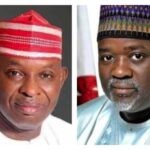
The Supreme Court, on Wednesday, upheld the victory of Adamawa State Governor, Ahmadu Fintiri, in the March 18 governorship election.
The apex court dismissed an appeal by the Social Democratic Party and its candidate, Umar Ardo, seeking to nullify Fintiri’s victory.
A five-man panel of Supreme Court Justices, led by Justice John Okoro, dismissed the appeal, after the SDP, through its counsel, Sylvester Imhanobe, opted to withdraw the appeal.
The Adamawa State Governorship Election Petitions Tribunal and the Court of Appeal in Abuja had earlier dismissed the SDP case against Fintiri.
In the petition, the SDP contended that the conduct of the poll did not comply with the provisions of the Electoral Act 2022.
However, at Wednesday’s proceedings, the Supreme Court Justices engaged the SDP lawyer to explain how the election deviated from the procedures outlined in the Electoral Act.
Unable to persuade the court despite spirited efforts, Imhanobe applied to withdraw the case, prompting the apex court to dismiss it.
Finitiri is now left with the appeal filed by the All Progressives Congress and its candidate, Aishatu Dahiru, seeking to be declared the governor of the state.
Meanwhile, the apex court has reserved judgment in the appeals by the Peoples Democratic Party and the All Progressives Congress challenging the election of Abia State Governor, Alex Otti.
The five-man panel, led by Justice Okoro, adjourned for judgment after taking arguments from parties involved in the matters.
Otti of the Labour Party polled 175,466 votes to defeat his closest rival, Okey Ahiwe of the PDP, who scored 88,529 votes in the March 18 governorship election.
The Court of Appeal sitting in Lagos and the election petition tribunal had dismissed the petitions by Ahiwe and Ikechi Emenike of the APC.
The APC and the PDP are asking the apex court to nullify Otti’s election.
Making his submissions at the apex court on Wednesday, the counsel for Ahiwe, Uche Ihediuwa (SAN), alleged that the votes garnered by his client in the Obingwa Local Government Area were illegally reduced.
He said the PDP candidate had 108,000 votes in the LG but the figure was allegedly recomputed by the Returning Officer upon her return from Abuja.
He said, “Our client had 108,000 votes in Obingiwa Local Government. In breach of the rules, the results were not computed. The first respondent (INEC) reduced our votes from 108,000 to 20,000 in Obingiwa Local Government. Our agent was chased away from the Abia State Governorship Election Collation Centre.
“We tried to access the iReV but were denied access. When there is a dispute, the Returning Officers ought to go to iRev. She came back from Abuja and announced the result.
“Our client had to approach the All Progressives Congress before it could access results sheets and discovered the malpractices.”
But counsel for the LP, Owonikoko Abiodun (SAN), said the number of votes the PDP candidate claimed to have polled in the LG was far above the number of voters accredited for the House of Assembly held the same day.
He noted that their evidence was rejected by the lower courts.
Owonikoko, however, stated that his client had 174,000 votes, adding that he remained the winner even if the purported 84,000 deducted votes were added to PDP’s candidates.
He said, “In the House of Assembly election held on the same day, the total number of votes was 27,000 while that of the governorship was 108,000.
“The Obingiwa magic did not work in this election. It usually overturns the election of the state. However, Section 65 of the Electoral Act did not allow it to work. Even if we agree, the margin of result will not change anything. “
The counsel for the governor, Onyechi Ikpeazu (SAN), urged the court to dismiss the appeal, adding that the stamp on the result sheets presented was for the ward and not the LG.
He said, “I urge My Lords to dismiss the appeal. The result sheet presented had the stamp of a ward and not an LGA. “
On the APC’s appeal, counsel for the appellant, Abubakar Malami (SAN), urged the court to disqualify the governor and the PDP candidate and declare his client the winner of the election.
Malami argued that the sponsorship and nomination of candidates for an election was a constitutional matter.
Malami said, “It is not about the votes involved. The constitutionality in the membership and sponsorship of the candidates appeal as a noble one to be looked at. This is backed by Section 177 of the Constitution.
“The two lower courts did not adduce sufficient evidence to the effect that the candidates were not duly sponsored. Evidence was produced but was improperly expunged by the trial court. “
When Justice Helen Ogunwunmiju asked Malami why the lower court removed the evidence, he said, “The trial court said it was an internal affair of the party. (But) It is not, this is a constitutional issue.”
Interjecting, John Okoro remarked: “If not that you a SAN, this appeal is like somebody looking for something.”
But Malami insisted that: “Where nomination and sponsorship is an issue in any matter it can’t be said that it is an internal affair of the party, according to Section 177 © (of the Constitution) and the court has jurisdiction on it. The idea that it is an internal affair of the party does not arise. “
The counsel for INEC, Nasiru Tijani, urged the court to dismiss the appeal with substantial court.
Similarly, the counsel for the second respondent, Tobechukwu K. while urging the court to dismiss the appeal, noted that there was nothing novel in the matter.
Counsel for the fourth and fifth respondents, Udochi Iheanacho said her clients resigned 30 days before the election. He, however, urged the apex court to uphold the decisions of the lower courts.





